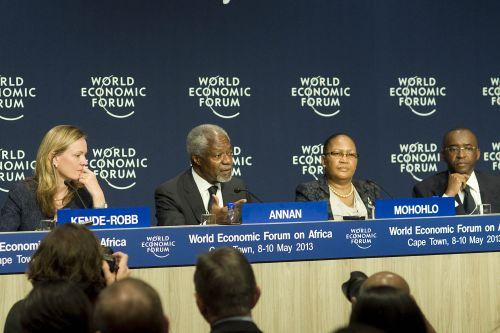Cape Town – Revenues from mining in Africa are not reducing the gap between the rich and the poor on the continent, the Africa Progress Panel said on Friday 10.
The panel, which consists of eminent persons chaired by former United Nations secretary-general Kofi Annan, released its Africa Progress report for 2013.
Speaking in Cape Town at the World Economic Forum on Africa, Annan said while the past decade had brought growth to several African countries, some crucial interventions were needed to ensure revenues were not hidden in tax havens, but invested in critical areas such as health and education.
The interventions should include African countries putting in place bold policies for transparency and accountability.
« The Africa Progress Panel finds it unconscionable that some companies, often supported by dishonest officials, are using unethical tax avoidance, transfer pricing, and anonymous company ownership to maximise their profits, while millions of Africans go without adequate nutrition, health, and education, » Annan said.
African countries needed strategies that would dictate to investors the terms under which natural resources should be developed.
These strategies should include fiscal arrangements and tax regimes.
It should also be linked to creating more jobs.
« Processing natural resources before exporting them brings extra value to a country’s natural resource sector, » Annan said.
According to Bloomberg from Cape-Town, the Democratic Republic of Congo lost out on about $1.4 billion in revenue by selling undervalued copper and cobalt deposits now controlled by Glencore Xstrata Plc and Eurasian Natural Resources Corp., a group led by former United Nations Secretary-General Kofi Annan said.
The figure represents a “small share” of overall losses as state-owned companies underpriced assets they sold to companies owned by Israeli billionaire Dan Gertler between 2010 and 2012, the 10-member African Progress Panel said in a report released at the World Economic Forum on Africa in Cape Town.
Glencore, ENRC and Gertler deny any wrongdoing. “Privatization of the DRC’s minerals sector has been plagued by a culture of secrecy, informal deals and allegations of corruption,” today’s report said. “Concessions have been sold on terms that appear to generate large profits for foreign investors, most of them registered in offshore centers, with commensurate losses for public finance.”
Congo’s losses point to a continent-wide ailment in which a resources boom is widening inequality and growth in joblessness, rather than spreading dividends amongst the population, the 119-page report said.
Gertler has entered into joint ventures with companies including Glencore and ENRC since arriving as a diamond trader in 1997. The failure by state-owned companies to publish some of those deals prompted the International Monetary Fund in December to stop a loan program to what the UN ranks as the least developed country in the world.

Commercial Secrecy
“The complex structures of interlocking offshore companies, commercial secrecy on the part of major mining companies, and limited reporting by state companies and government agencies to the DRC’s legislators, creates what amounts to a secret world,” the report said. “A world in which vast fortunes appear to be accumulated at the expense of the DRC’s people.”
The Annan panel’s report contains “basic errors, selective information and repeated the same old, disproven allegations” against Gertler and his Fleurette Group, the company said.
“The Fleurette Group is the biggest taxpayer in the DRC and has generated substantial inward investment, created tens of thousands of jobs and is the country’s largest, long term investor,” it said in an e-mailed statement to Bloomberg.
ENRC Response
ENRC said in an e-mailed statement that all its acquisitions since its 2007 initial public offering “followed appropriate regulatory and board best practice and were cleared by a committee of non-executive directors, led by our former Executive Chairman Mehmet Dalman, alongside the professional advisers whose approvals for these transactions is mandatory.”
Glencore has invested more than $3.3 billion in two mining projects in DRC and has created almost 10,000 jobs in the country, it said in an e-mailed statement on May 10.
The 10-member panel includes former International Monetary Fund Managing Director Michel Camdessus, former Nigerian President Olusegun Obasanjo and musician Bob Geldof.
While the size of sub-Saharan Africa’s economy has more than tripled since 2000 to about $1.33 trillion last year, more than half its 1 billion people live on less than $1.25 a day,
World Bank data shows.
By Finace24 & Bloomberg




